- The Last Word: Media Coverage of the Supreme Court of Canada
Professor David Schneiderman (with Florian Sauvageau, Université Laval, and David Taras, University of Calgary) - Le Fédéralisme dans tous ses états / The States and Moods of Federalism: Governance, Identity and Methodology
Edited by Professor Jean-François Gaudreault-DesBiens (co-edited with Fabien Gélinas, University of Montreal) - Access to Care, Access to Justice: The Legal Debate over Private Health Insurance in Canada
Edited by Professors Colleen Flood, Kent Roach and Lorne Sossin - Labour Law, Work and Family: Critical and Comparative Perspectives
Edited by Professor Kerry Rittich (with Joanne Conaghan, University of Kent) - The Charter of Rights and Freedoms (Third Edition)
Professor Kent Roach (with Honourable Mr. Justice Robert J. Sharpe) - The Regulation of International Trade (Third Edition)
Professor Michael Trebilcock (with Robert Howse, University of Michigan) - University of Toronto Law Journal Special Issue - Essays in Honour of John Willis, Administrative Law Today: Culture, Ideas, Institutions, Processes, Values
(Volume LV, Number 3, Summer 2005)
Professors Alan Brudner (Editor) and David Dyzenhaus (Book Review Editor)
The Last Word: Media Coverage of the Supreme Court of Canada
Professor David Schneiderman (with Florian Sauvageau, Université Laval, and David Taras, University of Calgary)
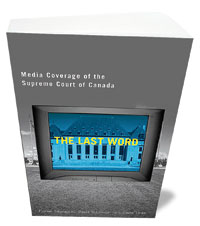 From the publisher: Media coverage of the Supreme Court of Canada has emerged as a crucial factor not only for judges and journalists but also for the public, which understands the work of the court through the media. Journalists and news organizations decide which court rulings they will cover, and how. Simply put, once judges hand down rulings, they lose control of the message. Journalists have the last word. To show how the Supreme Court has fared under the media spotlight, the authors examine a year of media coverage, and more in depth, four high-profile cases including the Marshall case (Aboriginal rights); the Vriend case (gay rights); the Quebec Secession Reference; and the Sharpe child pornography case. They explore the differences between television and newspaper coverage, national and regional reporting, and the French- and English-language media. The authors also describe how judges and journalists understand and interact with one another amid often-clashing legal and journalistic cultures, offering a rich and detailed account of the relationship between two of the most important institutions in Canadian life.
From the publisher: Media coverage of the Supreme Court of Canada has emerged as a crucial factor not only for judges and journalists but also for the public, which understands the work of the court through the media. Journalists and news organizations decide which court rulings they will cover, and how. Simply put, once judges hand down rulings, they lose control of the message. Journalists have the last word. To show how the Supreme Court has fared under the media spotlight, the authors examine a year of media coverage, and more in depth, four high-profile cases including the Marshall case (Aboriginal rights); the Vriend case (gay rights); the Quebec Secession Reference; and the Sharpe child pornography case. They explore the differences between television and newspaper coverage, national and regional reporting, and the French- and English-language media. The authors also describe how judges and journalists understand and interact with one another amid often-clashing legal and journalistic cultures, offering a rich and detailed account of the relationship between two of the most important institutions in Canadian life.
Back to Top
Le Fédéralisme dans tous ses états / The States and Moods of Federalism: Governance, Identity and Methodology
Edited by Professor Jean-François Gaudreault-DesBiens (co-edited with Fabien Gélinas, University of Montreal)
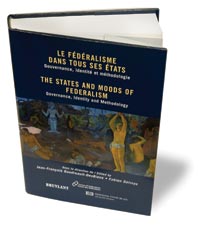 From the publisher: The moods of federalism are swinging. Although the past few years have evidenced a resurgence of interest in the practice and study of federalism, it is has become obvious that the multiplicity of its modern forms complicates our understanding. In fact, while they share a number of fundamental characteristics, federal structures are elaborated in particular socio-political contexts and evolve in unique ways. In this context, the study of the varied expressions of the "federal phenomenon" appears more promising than the traditional understanding of federalism as a mode of state organization. This book aims to recast juridical thinking in a dialogical relationship with political, economic and philosophical thought in this area of research. It is a contribution to the laying bare of ideas of federalism with a view to opening up new perspectives on this complex phenomenon.
From the publisher: The moods of federalism are swinging. Although the past few years have evidenced a resurgence of interest in the practice and study of federalism, it is has become obvious that the multiplicity of its modern forms complicates our understanding. In fact, while they share a number of fundamental characteristics, federal structures are elaborated in particular socio-political contexts and evolve in unique ways. In this context, the study of the varied expressions of the "federal phenomenon" appears more promising than the traditional understanding of federalism as a mode of state organization. This book aims to recast juridical thinking in a dialogical relationship with political, economic and philosophical thought in this area of research. It is a contribution to the laying bare of ideas of federalism with a view to opening up new perspectives on this complex phenomenon.
Back to Top
Access to Care, Access to Justice: The Legal Debate over Private Health Insurance in Canada
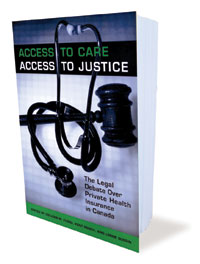 From the publisher: In September 2005, some of the top Canadian scholars in the fields of constitutional law and health policy exchanged ideas and discussed the potential legal course for Canada following the Chaoulli decision (June 2005). Access to Care, Access to Justice contains all the papers given at this conference, and was published just three weeks later. Historically, the Supreme Court of Canada has avoided direct intervention in health care policy-making, but that posture changed dramatically with the Supreme Court striking down Quebec laws prohibiting the sale of private health insurance. The collection explores the role that courts may begin to play in health care and how this new role is of crucial importance to the Canadian public and their governments. As litigators for those who favour more freedom to provide private health care and aggrieved patients marshal their legal resources, provinces across the country are considering their options. Some are seeking guidance on how to better insulate themselves from review; others may welcome such challenges as a way to revisit the provisions of the Canada Health Act. The contributors to this book examine how the future of Canadian health care is likely to be determined both in the courts and in the legislatures and scrutinize how these changes will affect Canadians.
From the publisher: In September 2005, some of the top Canadian scholars in the fields of constitutional law and health policy exchanged ideas and discussed the potential legal course for Canada following the Chaoulli decision (June 2005). Access to Care, Access to Justice contains all the papers given at this conference, and was published just three weeks later. Historically, the Supreme Court of Canada has avoided direct intervention in health care policy-making, but that posture changed dramatically with the Supreme Court striking down Quebec laws prohibiting the sale of private health insurance. The collection explores the role that courts may begin to play in health care and how this new role is of crucial importance to the Canadian public and their governments. As litigators for those who favour more freedom to provide private health care and aggrieved patients marshal their legal resources, provinces across the country are considering their options. Some are seeking guidance on how to better insulate themselves from review; others may welcome such challenges as a way to revisit the provisions of the Canada Health Act. The contributors to this book examine how the future of Canadian health care is likely to be determined both in the courts and in the legislatures and scrutinize how these changes will affect Canadians.
Back to Top
Labour Law, Work and Family: Critical and Comparative Perspectives
Edited by Professor Kerry Rittich (with Joanne Conaghan, University of Kent)
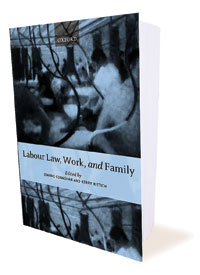 From the publisher: In recent years, gender has emerged as an important focus of attention in discourse in and around labour law. Gender is gradually moving from the margin to the mainstream of labour law debate, particularly with the development of 'familyfriendly' policy agendas in many countries. This book consists of a series of essays from leading international legal scholars exploring the shifting boundary between work and family from a labour law perspective. The object is to assess the global implications for labour law and policy of women's changing roles in paid and unpaid work. Key themes informing the collection include the place of unpaid care work in the performance and structure of productive activity and the implications of the interdependence of work and family activities for the legal regulation of work. This collection is part of an ongoing exploration into the distributive implications of economic and political globalization.
From the publisher: In recent years, gender has emerged as an important focus of attention in discourse in and around labour law. Gender is gradually moving from the margin to the mainstream of labour law debate, particularly with the development of 'familyfriendly' policy agendas in many countries. This book consists of a series of essays from leading international legal scholars exploring the shifting boundary between work and family from a labour law perspective. The object is to assess the global implications for labour law and policy of women's changing roles in paid and unpaid work. Key themes informing the collection include the place of unpaid care work in the performance and structure of productive activity and the implications of the interdependence of work and family activities for the legal regulation of work. This collection is part of an ongoing exploration into the distributive implications of economic and political globalization.
Back to Top
The Charter of Rights and Freedoms (Third Edition)
Professor Kent Roach (with Honourable Mr. Justice Robert J. Sharpe)
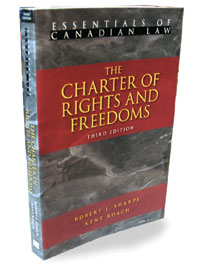 From the publisher: No other Canadian book provides such an accessible yet thorough and objective account of the Canadian Charter of Rights and Freedoms. The text has been thoroughly updated to reflect Charter jurisprudence since publication of the second edition in 2002. New cases discussed include Chaoulli v. Quebec, Auton v. British Columbia and NAPE v. Newfoundland. The book also covers the history of the Charter, legitimacy of judicial review, limitation of Charter rights, Charter litigation, language rights, equality rights, and Charter rights of the criminally accused.
From the publisher: No other Canadian book provides such an accessible yet thorough and objective account of the Canadian Charter of Rights and Freedoms. The text has been thoroughly updated to reflect Charter jurisprudence since publication of the second edition in 2002. New cases discussed include Chaoulli v. Quebec, Auton v. British Columbia and NAPE v. Newfoundland. The book also covers the history of the Charter, legitimacy of judicial review, limitation of Charter rights, Charter litigation, language rights, equality rights, and Charter rights of the criminally accused.
Back to Top
The Regulation of International Trade (Third Edition)
Professor Michael Trebilcock (with Robert Howse, University of Michigan)
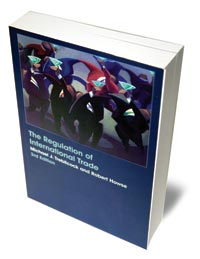 From the publisher: First published in 1995, the third edition of this successful textbook retains its popular features and includes full coverage of new developments including the WTO talks in Doha, national attitudes to the Kyoto protocol and new material on case law. The authors draw their analysis on aspects of the subject from classic and contemporary literature on trade and political economy. Including an introduction to the rules and institutions that govern international trade, this updated book covers news issues such as trade and competition, trade and labour rights, the Multilateral Agreement on Investment, the Basic Telecoms and Financial Services WTO Agreements, and an analysis of the first three years of WTO dispute rulings, including those of the Appellate Body.
From the publisher: First published in 1995, the third edition of this successful textbook retains its popular features and includes full coverage of new developments including the WTO talks in Doha, national attitudes to the Kyoto protocol and new material on case law. The authors draw their analysis on aspects of the subject from classic and contemporary literature on trade and political economy. Including an introduction to the rules and institutions that govern international trade, this updated book covers news issues such as trade and competition, trade and labour rights, the Multilateral Agreement on Investment, the Basic Telecoms and Financial Services WTO Agreements, and an analysis of the first three years of WTO dispute rulings, including those of the Appellate Body.
Back to Top
University of Toronto Law Journal Special Issue - Essays in Honour of John Willis, Administrative Law Today: Culture, Ideas, Institutions, Processes, Values (Volume LV, Number 3, Summer 2005)
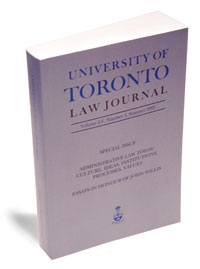 From the publisher: In September 2004, the Faculty hosted a conference to commemorate the life and scholarship of Professor John Willis (1907-1997), Canada's foremost scholar of public law. Prof. Willis taught at U of T's Faculty of Law for nearly 20 years. The conference brought together scholars from New Zealand, England, the United States of America as well as Canada, and was organized by Professors Harry Arthurs (Osgoode), David Dyzenhaus (Toronto), Martin Loughlin (LSE), and Mike Taggart (Auckland). Prof. Willis was an important part of the Faculty's history. In 1949, he and colleagues 'Caesar' Wright and Bora Laskin resigned from Osgoode Hall law school and joined the University of Toronto. Together, they helped persuade the Law Society of Upper Canada to recognize the LL.B. degree that had been newly established at U of T's Faculty of Law. Prof. Willis went on to teach law at U of T from 1949-1952 and again from 1959 to 1972. He was considered by his students to be among the best teachers they encountered. His first book, The Parliamentary Powers of English Government Departments, published in 1933, is still regarded as a classic. Many of his most influential articles were published in the University of Toronto Law Journal, which has now published the proceeds of the conference in its special issue of Summer 2005.
From the publisher: In September 2004, the Faculty hosted a conference to commemorate the life and scholarship of Professor John Willis (1907-1997), Canada's foremost scholar of public law. Prof. Willis taught at U of T's Faculty of Law for nearly 20 years. The conference brought together scholars from New Zealand, England, the United States of America as well as Canada, and was organized by Professors Harry Arthurs (Osgoode), David Dyzenhaus (Toronto), Martin Loughlin (LSE), and Mike Taggart (Auckland). Prof. Willis was an important part of the Faculty's history. In 1949, he and colleagues 'Caesar' Wright and Bora Laskin resigned from Osgoode Hall law school and joined the University of Toronto. Together, they helped persuade the Law Society of Upper Canada to recognize the LL.B. degree that had been newly established at U of T's Faculty of Law. Prof. Willis went on to teach law at U of T from 1949-1952 and again from 1959 to 1972. He was considered by his students to be among the best teachers they encountered. His first book, The Parliamentary Powers of English Government Departments, published in 1933, is still regarded as a classic. Many of his most influential articles were published in the University of Toronto Law Journal, which has now published the proceeds of the conference in its special issue of Summer 2005.
Back to Top

 From the publisher: Media coverage of the Supreme Court of Canada has emerged as a crucial factor not only for judges and journalists but also for the public, which understands the work of the court through the media. Journalists and news organizations decide which court rulings they will cover, and how. Simply put, once judges hand down rulings, they lose control of the message. Journalists have the last word. To show how the Supreme Court has fared under the media spotlight, the authors examine a year of media coverage, and more in depth, four high-profile cases including the Marshall case (Aboriginal rights); the Vriend case (gay rights); the Quebec Secession Reference; and the Sharpe child pornography case. They explore the differences between television and newspaper coverage, national and regional reporting, and the French- and English-language media. The authors also describe how judges and journalists understand and interact with one another amid often-clashing legal and journalistic cultures, offering a rich and detailed account of the relationship between two of the most important institutions in Canadian life.
From the publisher: Media coverage of the Supreme Court of Canada has emerged as a crucial factor not only for judges and journalists but also for the public, which understands the work of the court through the media. Journalists and news organizations decide which court rulings they will cover, and how. Simply put, once judges hand down rulings, they lose control of the message. Journalists have the last word. To show how the Supreme Court has fared under the media spotlight, the authors examine a year of media coverage, and more in depth, four high-profile cases including the Marshall case (Aboriginal rights); the Vriend case (gay rights); the Quebec Secession Reference; and the Sharpe child pornography case. They explore the differences between television and newspaper coverage, national and regional reporting, and the French- and English-language media. The authors also describe how judges and journalists understand and interact with one another amid often-clashing legal and journalistic cultures, offering a rich and detailed account of the relationship between two of the most important institutions in Canadian life. From the publisher: The moods of federalism are swinging. Although the past few years have evidenced a resurgence of interest in the practice and study of federalism, it is has become obvious that the multiplicity of its modern forms complicates our understanding. In fact, while they share a number of fundamental characteristics, federal structures are elaborated in particular socio-political contexts and evolve in unique ways. In this context, the study of the varied expressions of the "federal phenomenon" appears more promising than the traditional understanding of federalism as a mode of state organization. This book aims to recast juridical thinking in a dialogical relationship with political, economic and philosophical thought in this area of research. It is a contribution to the laying bare of ideas of federalism with a view to opening up new perspectives on this complex phenomenon.
From the publisher: The moods of federalism are swinging. Although the past few years have evidenced a resurgence of interest in the practice and study of federalism, it is has become obvious that the multiplicity of its modern forms complicates our understanding. In fact, while they share a number of fundamental characteristics, federal structures are elaborated in particular socio-political contexts and evolve in unique ways. In this context, the study of the varied expressions of the "federal phenomenon" appears more promising than the traditional understanding of federalism as a mode of state organization. This book aims to recast juridical thinking in a dialogical relationship with political, economic and philosophical thought in this area of research. It is a contribution to the laying bare of ideas of federalism with a view to opening up new perspectives on this complex phenomenon. From the publisher: In September 2005, some of the top Canadian scholars in the fields of constitutional law and health policy exchanged ideas and discussed the potential legal course for Canada following the Chaoulli decision (June 2005). Access to Care, Access to Justice contains all the papers given at this conference, and was published just three weeks later. Historically, the Supreme Court of Canada has avoided direct intervention in health care policy-making, but that posture changed dramatically with the Supreme Court striking down Quebec laws prohibiting the sale of private health insurance. The collection explores the role that courts may begin to play in health care and how this new role is of crucial importance to the Canadian public and their governments. As litigators for those who favour more freedom to provide private health care and aggrieved patients marshal their legal resources, provinces across the country are considering their options. Some are seeking guidance on how to better insulate themselves from review; others may welcome such challenges as a way to revisit the provisions of the Canada Health Act. The contributors to this book examine how the future of Canadian health care is likely to be determined both in the courts and in the legislatures and scrutinize how these changes will affect Canadians.
From the publisher: In September 2005, some of the top Canadian scholars in the fields of constitutional law and health policy exchanged ideas and discussed the potential legal course for Canada following the Chaoulli decision (June 2005). Access to Care, Access to Justice contains all the papers given at this conference, and was published just three weeks later. Historically, the Supreme Court of Canada has avoided direct intervention in health care policy-making, but that posture changed dramatically with the Supreme Court striking down Quebec laws prohibiting the sale of private health insurance. The collection explores the role that courts may begin to play in health care and how this new role is of crucial importance to the Canadian public and their governments. As litigators for those who favour more freedom to provide private health care and aggrieved patients marshal their legal resources, provinces across the country are considering their options. Some are seeking guidance on how to better insulate themselves from review; others may welcome such challenges as a way to revisit the provisions of the Canada Health Act. The contributors to this book examine how the future of Canadian health care is likely to be determined both in the courts and in the legislatures and scrutinize how these changes will affect Canadians. From the publisher: In recent years, gender has emerged as an important focus of attention in discourse in and around labour law. Gender is gradually moving from the margin to the mainstream of labour law debate, particularly with the development of 'familyfriendly' policy agendas in many countries. This book consists of a series of essays from leading international legal scholars exploring the shifting boundary between work and family from a labour law perspective. The object is to assess the global implications for labour law and policy of women's changing roles in paid and unpaid work. Key themes informing the collection include the place of unpaid care work in the performance and structure of productive activity and the implications of the interdependence of work and family activities for the legal regulation of work. This collection is part of an ongoing exploration into the distributive implications of economic and political globalization.
From the publisher: In recent years, gender has emerged as an important focus of attention in discourse in and around labour law. Gender is gradually moving from the margin to the mainstream of labour law debate, particularly with the development of 'familyfriendly' policy agendas in many countries. This book consists of a series of essays from leading international legal scholars exploring the shifting boundary between work and family from a labour law perspective. The object is to assess the global implications for labour law and policy of women's changing roles in paid and unpaid work. Key themes informing the collection include the place of unpaid care work in the performance and structure of productive activity and the implications of the interdependence of work and family activities for the legal regulation of work. This collection is part of an ongoing exploration into the distributive implications of economic and political globalization.  From the publisher: No other Canadian book provides such an accessible yet thorough and objective account of the Canadian Charter of Rights and Freedoms. The text has been thoroughly updated to reflect Charter jurisprudence since publication of the second edition in 2002. New cases discussed include Chaoulli v. Quebec, Auton v. British Columbia and NAPE v. Newfoundland. The book also covers the history of the Charter, legitimacy of judicial review, limitation of Charter rights, Charter litigation, language rights, equality rights, and Charter rights of the criminally accused.
From the publisher: No other Canadian book provides such an accessible yet thorough and objective account of the Canadian Charter of Rights and Freedoms. The text has been thoroughly updated to reflect Charter jurisprudence since publication of the second edition in 2002. New cases discussed include Chaoulli v. Quebec, Auton v. British Columbia and NAPE v. Newfoundland. The book also covers the history of the Charter, legitimacy of judicial review, limitation of Charter rights, Charter litigation, language rights, equality rights, and Charter rights of the criminally accused.  From the publisher: First published in 1995, the third edition of this successful textbook retains its popular features and includes full coverage of new developments including the WTO talks in Doha, national attitudes to the Kyoto protocol and new material on case law. The authors draw their analysis on aspects of the subject from classic and contemporary literature on trade and political economy. Including an introduction to the rules and institutions that govern international trade, this updated book covers news issues such as trade and competition, trade and labour rights, the Multilateral Agreement on Investment, the Basic Telecoms and Financial Services WTO Agreements, and an analysis of the first three years of WTO dispute rulings, including those of the Appellate Body.
From the publisher: First published in 1995, the third edition of this successful textbook retains its popular features and includes full coverage of new developments including the WTO talks in Doha, national attitudes to the Kyoto protocol and new material on case law. The authors draw their analysis on aspects of the subject from classic and contemporary literature on trade and political economy. Including an introduction to the rules and institutions that govern international trade, this updated book covers news issues such as trade and competition, trade and labour rights, the Multilateral Agreement on Investment, the Basic Telecoms and Financial Services WTO Agreements, and an analysis of the first three years of WTO dispute rulings, including those of the Appellate Body. From the publisher: In September 2004, the Faculty hosted a conference to commemorate the life and scholarship of Professor John Willis (1907-1997), Canada's foremost scholar of public law. Prof. Willis taught at U of T's Faculty of Law for nearly 20 years. The conference brought together scholars from New Zealand, England, the United States of America as well as Canada, and was organized by Professors Harry Arthurs (Osgoode), David Dyzenhaus (Toronto), Martin Loughlin (LSE), and Mike Taggart (Auckland). Prof. Willis was an important part of the Faculty's history. In 1949, he and colleagues 'Caesar' Wright and Bora Laskin resigned from Osgoode Hall law school and joined the University of Toronto. Together, they helped persuade the Law Society of Upper Canada to recognize the LL.B. degree that had been newly established at U of T's Faculty of Law. Prof. Willis went on to teach law at U of T from 1949-1952 and again from 1959 to 1972. He was considered by his students to be among the best teachers they encountered. His first book, The Parliamentary Powers of English Government Departments, published in 1933, is still regarded as a classic. Many of his most influential articles were published in the University of Toronto Law Journal, which has now published the proceeds of the conference in its special issue of Summer 2005.
From the publisher: In September 2004, the Faculty hosted a conference to commemorate the life and scholarship of Professor John Willis (1907-1997), Canada's foremost scholar of public law. Prof. Willis taught at U of T's Faculty of Law for nearly 20 years. The conference brought together scholars from New Zealand, England, the United States of America as well as Canada, and was organized by Professors Harry Arthurs (Osgoode), David Dyzenhaus (Toronto), Martin Loughlin (LSE), and Mike Taggart (Auckland). Prof. Willis was an important part of the Faculty's history. In 1949, he and colleagues 'Caesar' Wright and Bora Laskin resigned from Osgoode Hall law school and joined the University of Toronto. Together, they helped persuade the Law Society of Upper Canada to recognize the LL.B. degree that had been newly established at U of T's Faculty of Law. Prof. Willis went on to teach law at U of T from 1949-1952 and again from 1959 to 1972. He was considered by his students to be among the best teachers they encountered. His first book, The Parliamentary Powers of English Government Departments, published in 1933, is still regarded as a classic. Many of his most influential articles were published in the University of Toronto Law Journal, which has now published the proceeds of the conference in its special issue of Summer 2005.